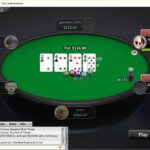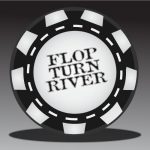Let’s suppose, just for purposes of illustration, that you and I are both playing in our local casino’s 10/20 Limit Hold ‘Em game. We both play about the same number of hours per year, and we are similar-style players. Let’s just be extra-optimistic in this scenario and say that we are both modest winners in this game. But now let’s say that I make you an offer: every time I make a straight flush in my game, I will fold it no matter what. Every time you flop a set, you will fold it no mater what. Then we will compare wins and losses at the end of the year. You’re probably thinking we’d both be idiots for doing that (and you’re right), but even if I always folded my straight flushes, I’d still likely come out the winner in that scenario, because they happen so infrequently! You’d lose much more profit folding your sets than I would my straight/royal flushes, and we’d both lose a lot of potential profit by folding such strong hands. But the point is that you and I need to be thinking about what we will be doing at the table BEFORE we sit down to play. Any pre-determined strategy or rigid “hand guide” will fail us in the long run because none can account for the specific nuances of the table that we are sitting at NOW.
If you put that rather silly example aside for a moment, we can talk about where I really wanted to go today. The example simply points out that any pre-determined strategy will have a tough shot at beating every game that we ever play in. But what if we consider specific moves within the game that will add to our profit, or cut down on our losses? In the end, those two outcomes have the same effect on our bankrolls, even though one feels much better than the other at times. The Check/Raise, the move that we are talking about today, is a particular play that you can and should use with discretion. It won’t help to pre-determine when you use it (i.e. “I’ll check/raise with straights or better,” etc.), but it will help very much to know WHY you are using it, and what you are trying to accomplish. Let’s see if we can find some good spots to use this move in.
I am assuming that you have an idea of what a check/raise is, but if not, here it is in a nutshell: anytime you check, someone behind you bets, and then you raise their bet, you are check/raising. It is usually perceived as a very powerful move, and most people will assume that your check/raise is announcing a monster holding, or possibly the absolute nut draw. If you c/r on the flop in a LHE game, some players will call your raise (in fact in a lower-limit game many players will). But then you have a dilemma on the turn – whether or not your hand is filled out, you really cannot afford to check again and watch them check behind you. That’s going to cost one extra big bet that you can never get back again. But if you bet on the turn and they fold, you’ve also cost yourself a chance at their turn and river bets that you might well have collected had you simply called on the flop. In our 10/20 game, that would equate to only getting $20 from them (from your c/r on the flop) when you could’ve have gotten $50 by simply staying with them the whole way, or even $70 in some cases by check/raising the river.
It’s a simple example, but the point is this: know your weapons, use them sparingly, and know WHY you are using them. If your opponent calls loosely, then by all means, check/raise him blind and let him call extra bets. If your opponent is tight enough or observant enough to have some idea of what’s going on, then you’re only going to get to use this move once on him, so pick a good spot. If you are a cash game player, even if you’re in a game where check/raising is not frowned upon and several players are doing it, know that it is a move that can be figured out fast, so its better to use it in later rounds of betting when the pot is large enough to force your opponent into calling the extra bet. If you are a tournament player, you can check/raise with lethal success if you use it late in a tournament to put a player’s life on the line. He may not want to get all-in, but if you can control the action that way while holding a monster, then he may have no choice.
Hopefully you put careful thought into the moves that you use in a game before you actually use them. You cannot control what cards come or what your opponent holds, but you CAN control how much you know about specific situations for extracting maximum profit. If you’re the kind of player who puts that kind of thought into your game regularly, then good luck wherever you play! If you’re not thinking it through, I’ll tell you where I play and I’d be happy to sit down in a game with you! All joking aside, I hope that you put careful thought into your next check/raise move – your bankroll will thank you if you do. Good Luck at the Tables!








